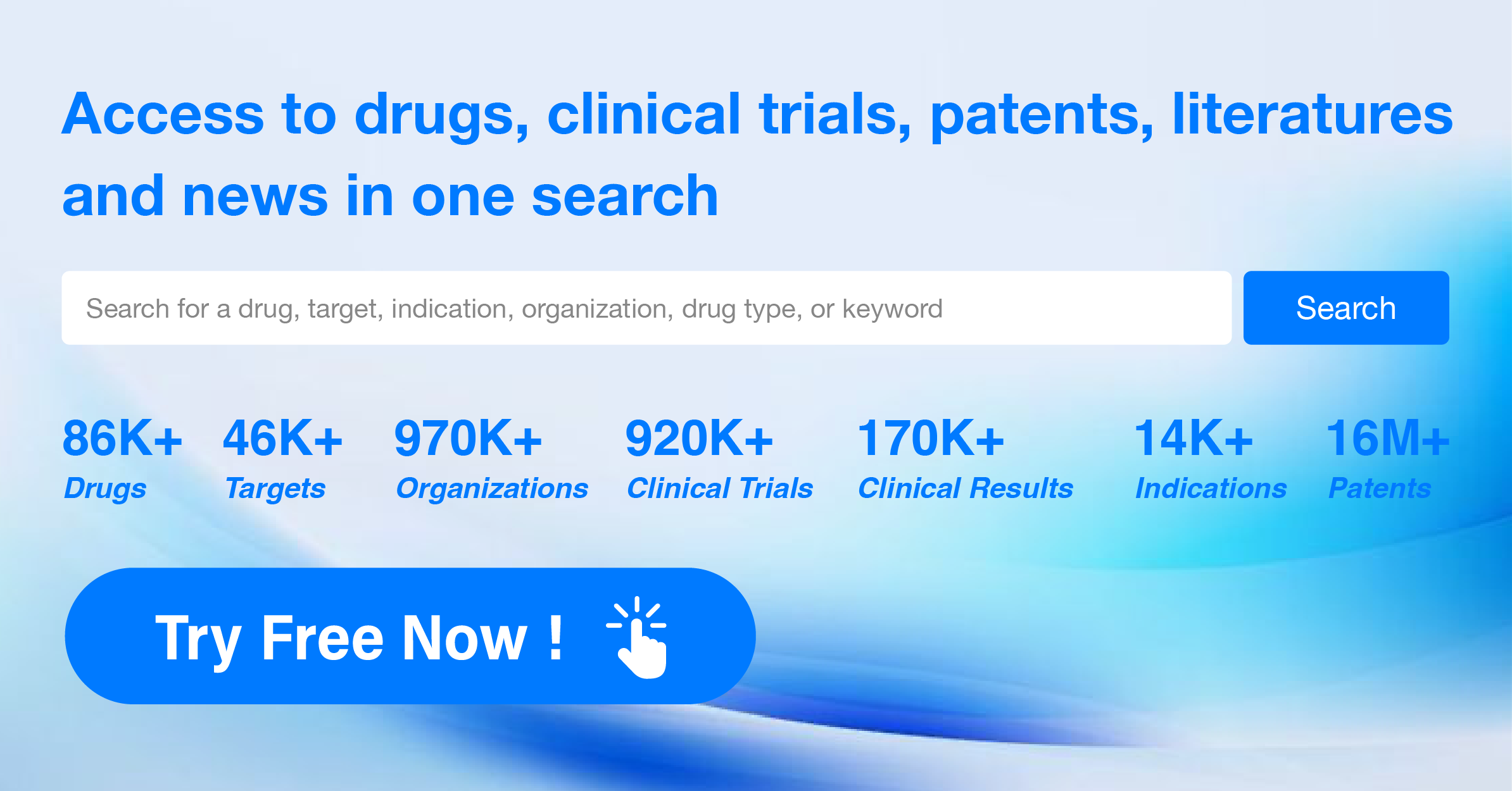Pharma Frontiers: Daily Digest of Global Pharmaceutical News - May 14
1.Dupilumab Seeks New Indication Approval in the U.S.
On May 13th, Regeneron Pharmaceuticals and Sanofi announced that the supplemental Biologics License Application (sBLA) for Dupilumab (brand name: Dupixent) to treat adolescents with Chronic Rhinosinusitis with Nasal Polyps (CRSwNP) has been granted priority review by the FDA, with a Prescription Drug User Fee Act (PDUFA) target date set for September 15, 2024. If approved, Dupilumab will become the first therapy in the United States for CRSwNP patients aged 12 to 17 years. The sBLA submission is primarily based on the positive treatment outcomes from two Phase III trials, SINUS-24 and SINUS-52, involving Dupilumab in adult patients. These studies included a total of 724 adult CRSwNP patients and assessed the efficacy and safety of Dupilumab (300mg administered every two weeks) in this patient group. The primary endpoints were the change in severity of nasal congestion/blockage symptoms at week 24 compared to baseline, and the change in Nasal Polyp Score (NPS) compared to baseline. In the SINUS-24 study, compared to placebo, the Dupilumab group showed significant improvement in nasal congestion/blockage symptoms (difference in score of 0.89, p<0.0001) and a significant reduction in NPS (difference in score of 2.06, p<0.0001). In the SINUS-52 study, compared to placebo, the Dupilumab group also showed significant improvement in nasal congestion/blockage symptoms (difference in score of 0.87, p<0.0001) and a significant reduction in NPS (difference in score of 1.80, p<0.0001). Additionally, Dupilumab reduced the need for systemic corticosteroids or surgery in adult CRSwNP patients.
Dupilumab is a fully human monoclonal antibody against IL-4Rα, jointly developed by Regeneron Pharmaceuticals and Sanofi. It inhibits signaling of the interleukin-4 (IL-4) and interleukin-13 (IL-13) pathways, thereby providing a therapeutic effect on inflammatory diseases.
2.BeiGene’s Zanubrutinib Granted Approval for New Indication in the Treatment of Follicular Lymphoma
On May 13, according to the official website of the NMPA (National Medical Products Administration), BeiGene's Zanubrutinib received approval for a new indication. This indication is for use in combination with obinutuzumab for patients with relapsed or refractory follicular lymphoma (FL) who have previously received at least two lines of systemic therapy. This indication has already been approved by the FDA. At the 2023 ASCO (American Society of Clinical Oncology) meeting, BeiGene reported the latest results from the Phase II ROSEWOOD study, evaluating the combination of Zanubrutinib and obinutuzumab in heavily pretreated R/R FL patients. The ROSEWOOD study is a randomized, open-label Phase II clinical trial aimed at evaluating the efficacy and safety of Zanubrutinib in combination with obinutuzumab versus obinutuzumab monotherapy in R/R FL. The study enrolled 217 participants, who were randomized in a 2:1 ratio to receive Zanubrutinib and obinutuzumab or obinutuzumab monotherapy. The results showed that at a median follow-up of 20.2 months, the ORR (Overall Response Rate) was 69.0% in the combination therapy group versus 45.8% in the monotherapy group, the complete remission rates were 39.3% versus 19.4%, 18-month DOR (Duration of Response) rates were 69.3% and 41.9%, and the median PFS (Progression-Free Survival) was 28.0 months versus 10.4 months. Following its achievement in 2023 of the 'billion-dollar molecule' milestone, BeiGene's core independently developed BTK inhibitor, Zanubrutinib, achieved notable success again. In the first quarter of 2024, global sales of Zanubrutinib reached RMB 3.476 billion, marking a 140.2% increase year-over-year. In China, Zanubrutinib's sales in the first quarter amounted to RMB 413 million, up 25.5% year-over-year.
3.Asieris Pharmaceuticals Announces Submission of Photodynamic Therapy Product APL-1702 for Market Approval
On May 12th, Asieris Pharmaceuticals announced that the National Medical Products Administration's Center for Drug Evaluation (CDE) in China has accepted the New Drug Application (NDA) for APL-1702, a non-surgical treatment product, designed for patients aged 18 and older with histologically confirmed high-grade squamous intraepithelial lesions (HSIL) of the cervix excluding carcinoma in situ. According to public data from Asieris Pharmaceuticals, APL-1702 is a photodynamic therapy product that combines both pharmaceutical and medical device components. Traditional treatments for cervical HSIL include local surgery, which can lead to complications such as cervical bleeding, infections, and cervical incompetence. Cervical incompetence can result in a range of reproductive problems, including preterm birth, miscarriage, and an increased rate of cesarean delivery. In the field of treatment for precancerous lesions of the cervix, there is currently a lack of non-surgical products approved for market that have demonstrated clinical efficacy through phase 3 clinical trials.
APL-1702, a photodynamic therapy product under development, has 5-aminolevulinic acid hexyl ester (HAL) as its active ingredient. Its therapeutic principle is based on the generation of large amounts of reactive oxygen species induced by the photosensitizer accumulated in target cells upon exposure to light, leading to apoptosis and necrosis of the lesion cells. According to a press release from Asieris Pharmaceuticals, APL-1702 has been validated in a randomized, double-blind, controlled international multicenter phase 3 clinical study, confirming its efficacy.
The approval of this product is expected to shift the treatment goals for precancerous lesions of the cervix, moving clinical focus from the immediate effects of excisional surgery to long-term disease management. The emphasis is on optimizing the benefit-risk ratio of treatment, seeking to reverse the disease while minimizing and delaying potentially damaging surgical interventions.
4.Sanofi's anti-CD40L monoclonal antibody SAR441344 (frexalimab) Initiates Phase III Clinical Trials in China
On May 13th, the Chinese Clinical Trial Registry and Information Disclosure Platform indicated that Sanofi's anti-CD40L monoclonal antibody SAR441344 (frexalimab) commenced a Phase III clinical trial in China. The product first entered Phase III in December 2023. This study is a randomized, double-blind, placebo-controlled clinical trial, aiming to recruit 20 participants domestically to evaluate the safety and efficacy of SAR441344 in adult patients with non-relapsing secondary progressive multiple sclerosis (SPMS). The primary endpoint of the study is the time within 6 months to disability progression confirmed by composite measures (cCDP).
SAR441344 functions by inhibiting the CD40/CD40L co-stimulatory pathway essential for the activation and function of adaptive immune cells (T/B cells) and innate immune cells (macrophages and dendritic cells), without depleting lymphocytes. This mechanism targets both acute and chronic neuroinflammation in multiple sclerosis (MS). The development of this product ranks at the forefront in the CD40L field, potentially making it the first CD40L-targeted therapy in this disease domain. In Phase II studies, SAR441344 demonstrated a reduction of 89% in new gadolinium-enhancing T1 brain lesions in MS patients. Should the Phase III study proceed successfully, Sanofi plans to apply for marketing authorization for SAR441344 for the treatment of MS in the year 2025. In addition, Sanofi is exploring the potential of this drug to preserve pancreatic beta-cell function in patients with Type 1 diabetes, possibly aiming to combine it with teplizumab, which is used to slow the progression of Type 1 diabetes.
5.DCR at 80%, Mabwell Bioscience Announces Clinical Results of ADC Therapy in Breast Cancer Treatment
On May 12th, Mabwell Bioscience announced the clinical progress of its independently developed antibody-drug conjugate (ADC), 9MW2821, targeting Nectin-4, for the indication of triple-negative breast cancer (TNBC). Current clinical data from monotherapy show that among 20 evaluable patients with locally advanced or metastatic TNBC who received a treatment dosage of 1.25 mg/kg, the objective response rate (ORR) and disease control rate (DCR) were 50% and 80% respectively. Notably, a patient who achieved complete remission (CR) has continued treatment for 20 months and remains in complete remission. TNBC is characterized by the absence of estrogen receptor (ER), progesterone receptor (PR), and human epidermal growth factor receptor 2 (HER2) immunohistochemically, making it resistant to endocrine therapy and anti-HER2 treatment and leaving a significant unmet clinical need as there have been no breakthroughs in its treatment for many years. 9MW2821, a targeted Nectin-4 ADC, upon injection, binds to Nectin-4 on the surface of tumor cells, enters the cells, and releases cytotoxins in a targeted manner through enzymatic action, thereby achieving precise tumor eradication.
Earlier this year, 9MW2821 was granted Fast Track and Orphan Drug designations by the U.S. FDA for the treatment of advanced, recurrent, or metastatic esophageal squamous cell carcinoma and esophageal cancer. Publicly available data also reveal clinical efficacy data for 9MW2821 under indications of cervical cancer and esophageal cancer. In the recurrent or metastatic cervical cancer patient group, the ORR and DCR were 40.54% and 89.19%, respectively; for advanced esophageal cancer, the ORR and DCR were 30% and 73.3%, respectively.
6.Boehringer Ingelheim GmbH Announces Early Positive Clinical Results for Innovative Antibody Therapy
Recently, Boehringer Ingelheim released positive data from the phase 1/2a clinical study HORNBILL of the investigational therapy BI 764524. The press release stated that this study marks the first exploration of treatment options for Diabetic Macular Ischemia (DMI). It was found that BI 764524 was well tolerated after both single and multiple intravitreal administrations, achieving its primary safety endpoint, and showing early signs of potential efficacy. The HORNBILL study consists of two parts: single ascending doses (SAD; N=12) and multiple dosing (MD; N=31), both of which met their primary safety endpoints. The study also met its preset early efficacy criteria, with the area of the foveal avascular zone stabilizing at week 16 compared to the sham injection group (p<0.2). This suggests that BI 764524 may have a positive impact on improving retinal non-perfusion and could potentially prevent further microvascular loss. No significant changes were observed in the secondary efficacy endpoints during the shorter trial period. The upcoming CRIMSON trial, a phase 2b clinical study, aims to further evaluate the safety and efficacy of BI 764524 in patients with Diabetic Retinopathy (DR) and is set to begin recruiting participants later this year. DMI is a common, irreversible complication of diabetic retinopathy that may lead to blindness. It occurs when the photoreceptive tissue of the central retina lacks sufficient blood supply over an extended period. Currently, there are no approved therapies for DMI. BI 764524 is a humanized monoclonal anti-Sema3A antibody, anticipated to stimulate vascular regeneration in ischemic regions and reduce retinal leakage, addressing the issue of retinal non-perfusion in retinal diseases. This compound, discovered and developed by Boehringer Ingelheim, is part of the company's portfolio for retinal disease research and development.
7.Arbor Biotechnologies Acquires Novel Gene Editing Technology, Developing Next-Generation Editors
Recently, the gene therapy company Arbor Biotechnologies announced the acquisition of Serendipity Biosciences, a biotech firm specializing in discovering unique gene editing technologies. The specific financial details were not disclosed. The novel editing technologies of Serendipity, discovered by the Feng Zhang laboratory, include those based on Fanzor, IsrB, and other undisclosed programmable editing technologies. These techniques will enhance Arbor's capabilities in RT editing (reverse transcriptase editing), and in inserting exons or entire genes both in vivo and in vitro, enriching Arbor's diverse toolbox of next-generation editors.
Dr. Devyn Smith, CEO of Arbor, stated that the company is committed to developing a range of compact gene editing tools, which can be delivered in any tissue-specific method, including through AAV, to treat potentially any genetic disease. The company focuses on developing therapies particularly suited for conditions affecting the liver and central nervous system. At the 2024 ASGCT Annual Meeting, Arbor presented preclinical data on their novel gene editing therapy ABO-101 for treating Primary Hyperoxaluria Type 1 (PH1), a rare genetic disorder characterized by excessive oxalate production in the liver. The oral report demonstrated that ABO-101 could highly specifically target the HAO1 gene in the liver, which encodes the upstream enzyme glycolate oxidase, implicated in the pathogenesis of PH1. In a preclinical model of PH1, ABO-101 effectively edited HAO1 in vivo. In non-human primates (NHPs), multiple doses of ABO-101 were well tolerated. The data from NHPs confirmed the efficacy and pharmacology of ABO-101: effective editing of HAO1 reduced the activity of glycolate oxidase. These findings support the ongoing IND-enabling studies.




